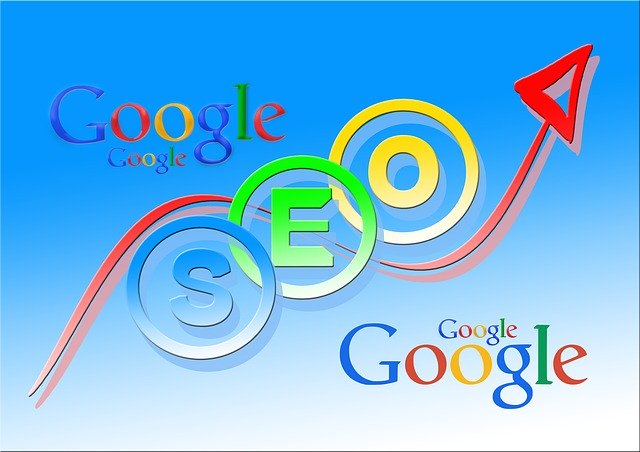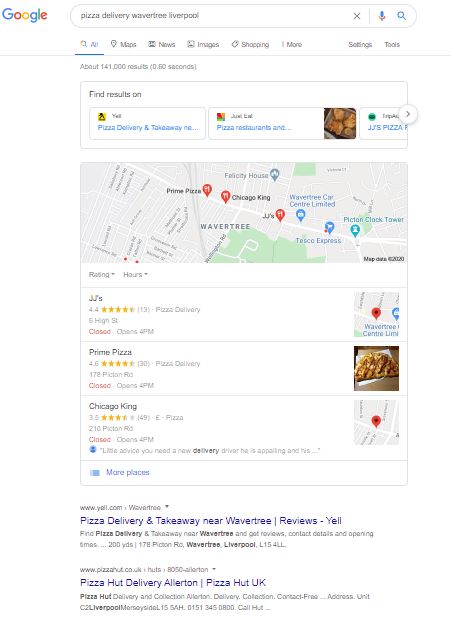Organic SEO v Local SEO: What’s the Difference?
Jun-2020

If you’ve been actively marketing your business online, you’ve probably heard of both local SEO and organic SEO. But you might find yourself wondering what the difference is between the two.
In this post, we’re going to walk you through the difference between local SEO and organic SEO as well as how they are related.
Both start with a search.
What is a local search?
The main difference between organic and local search is that local SEO has a geographical component.
If a user searches for industry + location, the search engine knows that the search has local intent. Search engines will also assume local intent in some searches. And all search engines want is to give the user exactly what they’re searching for.
Here’s how local search works:
It’s been a long day and I’m starving, but I don’t feel like cooking dinner. Who am I going to call? I search Google for “pizza delivery wavertree liverpool.”
So who’s coming to my rescue? Well, as you see, only three pizza places show up in the local results under the ads on the first page.

(And even if I just search for “Pizza” Google assumes I’m looking for a nearby pizza place.)
What Is Local SEO?
Local SEO is the act of optimizing your business’s online presence so that you show up in those local searches. We’ll talk more about that later on!
Back to those search results.
If you look below those local results, you’ll see what is called the “organic” results. These are the results search engines return on searches they don’t see as having local intent.
What is organic search?
Organic search happens when search engines decide there’s no local intent in the search. The searcher is looking for information rather than a specific location.
Maybe I’m not as tired as I thought I was. I think I’ll make a pizza instead of ordering one. So I search for “Pizza Recipe” (I was hungry when I wrote this) and the search engine will try to give me the best, most relevant recipes.
So, you might be wondering how search engines determine which pizza places (local results) or recipes (organic results) are the best or the most relevant.
Search engines use hundreds of factors to rank and index websites in searches, including keywords, outbound and inbound links and even grammar, to name just a few.
Who Should Rank in Local Vs. Organic search?
Brick and mortar businesses with a physical office in a specific location will want to rank high in a local search. The searcher is likely looking for a place to go for a specific product or service, so local businesses need to show up in local searches for their industry.
On the other hand, if you want your business to show up for certain search terms but not for a specific location, you want to try to rank higher in organic search.
For example, if you sell kitchen supplies online but your business has no physical location and doesn’t serve a specific area, you want to show up in organic searches. Targeting a specific location would mean losing potential customers in this case.
Can/Should Local Businesses Rank High in Organic Searches?
Multi-location brands should rank locally as well as organically since they tend to have a website they want to rank for general, branded searches. But, they also want to rank locally so that local consumers find their storefronts. You might also want to be found both locally and organically if your local business has a blog.
That’s where organic SEO comes into play. Search engine optimization is the process of trying to make sure search engines know which searches your business or website is relevant for.
To rank higher in search results, both organically and locally, your business has to be relevant to a specific search. And to show search engines your business is the right answer for a particular query, you have to state the obvious.
Why Local SEO (Local Search Marketing)
It’s important for your business to show up in relevant local searches because 50 percent of searchers visit businesses within 24 hours of a local search.
Naturally, optimizing a business for local SEO has a lot to do with location. Search engines need to know exactly where your business is located so that when someone searches for a location, the search engine can find the businesses that are located there.
To state the obvious for local SEO, you want to make sure your business’s name, address and phone number (NAP) is consistent across local listing directories as well as your website. That is the bare minimum you’ll need for local SEO, though.
For more information on being found online, here are a couple resources:
Organic SEO
Organic SEO has less to do with location and more to do with whether or not your website is relevant for certain searches.
When optimizing a website for organic search, the intention is to get the website to show up for certain searches. This could be a short term (pizza recipe) or a question spoken into voice search on a smartphone. (What’s the best pizza crust recipe?)
To state the obvious for organic SEO, you need to use specific keywords in headings and paragraphs (Don’t stuff the paragraphs full of keywords, but if you post a pizza crust recipe, you might want to use the words “pizza crust” a couple of times.)
How Do Local SEO and Organic SEO Affect Each Other?
There are also certain SEO practices that help both local and organic search rankings. For instance, when claiming your business page on local listing directories like Google, Bing, Yelp and TripAdvisor, you are also adding a link back to your website.
These local listing citations (your business’s name, address and phone number) help local SEO by telling search engines where you’re located. They create links back to your website, which counts as a link building strategy that helps your organic SEO efforts since search engines take the number of backlinks into account when they rank websites in search results.
And on-site local SEO (such as writing a locally focused blog post or updating a page by adding your business’s address) can also help your organic SEO. Search engines like fresh content, so while local SEO helps send out signals of local relevance, it can also help boost your organic SEO efforts.
When they’re done correctly, both local and organic SEO efforts will help improve your website rankings, but when done incorrectly, both can have a hugely detrimental effect on your digital marketing efforts.
Remember that even though SEO is optimization for search engines, it is what helps consumers find your business.
While you want to make sure search engines know what your business and your website are about, it’s important to think of those potential customers who are searching for your business.
Don’t just optimize so that Google knows what you do. Make sure searchers can find all the information they’ll need about your business, such as exact location, hours, services or products, etc.
